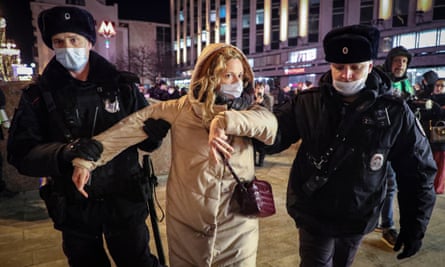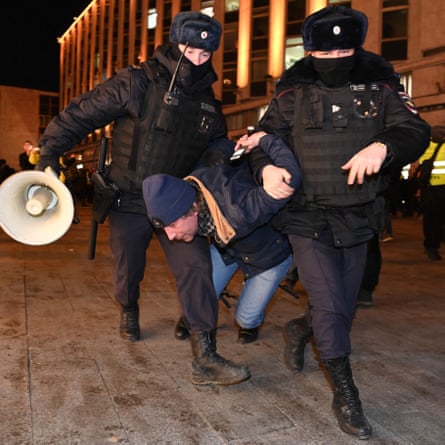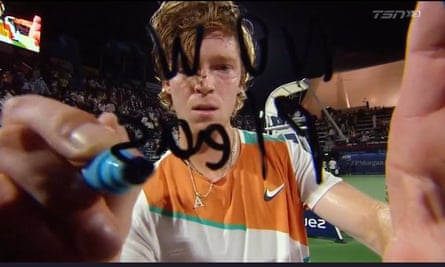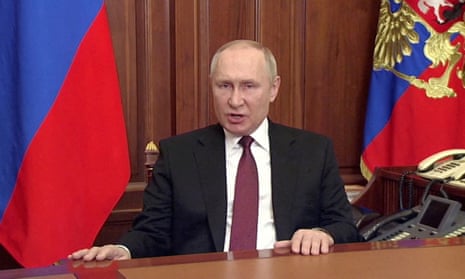The Kremlin’s invasion of Ukraine has played through a filter of propaganda here in Moscow, where the authorities appear concerned that ordinary Russians will be disgusted by scenes of missiles striking Kyiv and have sought to cut off the public from that uncomfortable truth.
To do so, the Russian government has taken extraordinary steps by throttling Facebook and threatening to shut independent media outlets such as TV Rain and the newspaper Novaya Gazeta, which published an edition in Russian and Ukrainian this week with the banner headline “Russia is bombing Ukraine”.
The media have been told to use only official government sources for their reports and not to use certain words to describe the operation. According to the Latvian-based Russian news website Meduza, the words are: “Attack, invasion, war.”
The restrictions are a window on how Russia wants to control the picture of its invasion of Ukraine to its own citizens and the unpopular steps, such as slowing and potentially cutting off access to Facebook, Instagram and Twitter, the Kremlin is willing to take.
Indeed Twitter confirmed last night that access to the platform had been restricted for some people in Russia, adding that it was “working to keep our service safe and accessible”.
Dmitry Muratov, the editor of Novaya Gazeta, had told the Observer he would defy demands by Roskomnadzor, the media watchdog, to self-censor, saying he would rely only on his own newsroom and special correspondents. Editors at other independent media have said the same. “Propaganda is like radiation,” said Muratov. “And it has touched many here.”
For Russians watching TV, Saturday began like any other: chat shows, old movies, or a programme about renovating your dacha. By the afternoon, it had kicked into high gear, with pundits on debate shows either downplaying or outright denying that an invasion was taking place.
Viewers of Russian television last week might think their country was only involved in a small operation in south-east Ukraine, and that the Ukrainian government was seeking to provoke a larger war.

“I just watched the Russian news specially and I have to say that if I had only watched that then my picture of the world would be completely different,” said Tatyana Stanovaya, the founder of the analysts R.Politik. “I think it’s entirely possible I would support Putin and his military operation.”
The divide has played out strangely in public. In a queue at Sberbank hours after Putin announced the military operation, one woman said loudly that she had been told by a friend in Kharkiv that “Russia’s bombing us.” Others turned to her angrily, as one responded dismissively: “I haven’t heard anything about that.” All were waiting to exchange roubles for dollars, aware that Russia was about to be hammered by sanctions and that the currency was losing its value.
But it can still get worse: in an extraordinary address on Friday evening, Vladimir Putin called on Ukrainian forces to overthrow their government, indicating that his ultimate goal is regime change. “It seems that it will be easier for us to come to an agreement than with this gang of drug addicts and neo-Nazis,” he said.
Military analysts see increased movements of heavy weaponry, including rocket artillery, that could point toward Russia attempting an all-out assault on Kyiv, one that would likely lead to higher numbers of dead and wounded. Russia’s ministry of defence ordered all its units to advance on Saturday evening, according to the Interfax news agency.
That effort will likely be accompanied by greater Kremlin pressure on the burgeoning anti-war movement in Russia, where activists, including some from Russia’s elite, have spoken out against a war they describe as an act of fratricide.
Ilya Krasilshchik, a former media editor and publisher and then head of a popular online food delivery service, said that he hadn’t listened to Putin’s announcement of a “special operation” because it was too “revolting”.

“I listened to [Volodymyr] Zelenskiy instead,” he said. “As someone said: ‘It’s been a long time since anyone spoke to the Russian people with that kind of love.’”
The Ukrainian president on Saturday spoke directly to the Russian people, thanking those who protested for their opposition to the war. He specifically mentioned prominent Russians like Muratov and the blogger Yury Dud, saying that Ukrainians had heard their effort.
“Stop those who lie,” said Zelenskiy. “They lie to us. They lie to you. And they are lying to the whole world. We need to stop this war.”
There is little likelihood that any protests will change Kremlin policy, which appears to be hardening in preparation for a bigger push on Kyiv. But the split in elite support for the operation indicates this will be different from Crimea, where public support was widely seen as about 85%. By contrast, the Levada Centre, an independent polling agency, reported last week that only 45% of Russians supported recognising the Russian-controlled territories in south-east Ukraine. Far fewer are believed to support a full-scale war against Ukraine.
Many of those Russians protesting against the war expressed feelings of anger, complicity, shame, and fear at the road the country was heading down.
“It’s mixed feelings of anger, fury, shame, you don’t know what to feel,” said Krasilshchik.
“Your world is falling apart on all fronts. It’s falling apart from within because you understand your reality is going to be completely different. It means everything. Ethical questions, questions about how you are going to live.

“But secondly you realise that at this moment there are people who feel far worse because they are being bombed. My problems… don’t mean anything compared with the problems Ukrainians feel right now.
“And thirdly you can’t even share these feelings because for the whole world you’re a pariah and true evil. And your passport is the passport of the aggressor. You don’t even know where to start.”
Krasilshchik, who has attended protests for more than 15 years, noted that Putin’s problems which had affected the country were quickly becoming those of the whole world.
“I am sure that we are guilty,” said Krasilshchik. “But I don’t understand at what moment we could have done anything differently.”
Many on both sides view this as a point of no return. Ilya Barabanov, a Russian reporter who has covered the war in Ukraine for the BBC, wrote in a first-person article that he felt similarly to how a German living in Kyiv must have felt on the first day of the second world war.
None of his friends had said anything bad to him but a question nagged at him.
“When my reporting trip comes to an end, and when the horror of war subsides, how will I be able to return home, to Russia, to my country, that has done this to Ukraine today?” he said.
